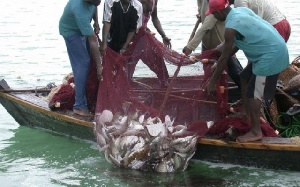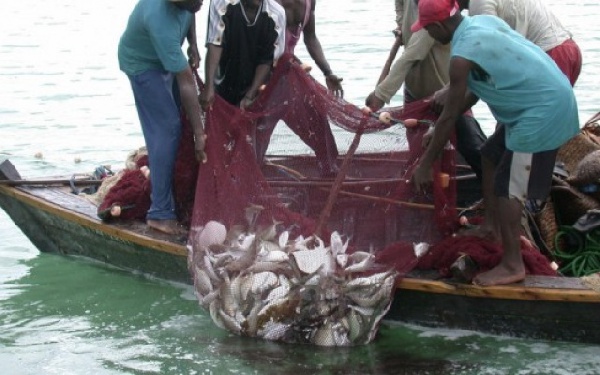 Fishermen pulling back their net after making a catch
Fishermen pulling back their net after making a catch
The Deputy Director-General of Operations at the Ghana Meteorological Agency (GMet), Dr Ignatius Kweku Williams, has appealed to all stakeholders within Ghana’s fishing and maritime sectors to take marine weather warnings seriously and collaborate closely with GMet to enhance safety at sea.
Speaking at the opening of a marine forecasting stakeholder engagement held at the University of Cape Coast, Dr Williams emphasized that the effectiveness of marine forecasts hinges not only on GMet’s delivery but also on the readiness of end users, especially fishers and boat operators to act on the information provided.
The Cape Coast workshop was part of GMet’s ongoing Marine Weather Forecasting engagement, aimed at deepening understanding of how marine weather information is received, interpreted, and applied in Ghana’s coastal communities.
Following a similar engagement held earlier in Keta, the Cape Coast session brought together stakeholders and representatives from Elmina, Winneba, Anomabo, Moree, and Cape Coast.
As in previous workshops, participants were presented with detailed case studies of real-life marine accidents — such as the Atikagome disaster on Volta Lake, vessel sinkings in Ada, and the Azizanya–Azizakpe capsize – to provoke reflection on the consequences of ignoring weather forecasts.
Representatives from the National Disaster Management Organization (NADMO), the Fisheries Commission, the Africa Centre of Excellence in Coastal Resilience (ACECoR), Canoe and Fishing Gear Owners Association of Ghana (CaFGOAG), the UCC Physics Department, and members of the media actively engaged in open dialogue and breakout sessions.
Key discussions focused on reasons why some marine warnings are disregarded, strategies for improving forecast communication, ensuring that fishers, boat operators, and vulnerable communities have a voice in the forecasting process.
The Cape Coast engagement reinforced the call for stronger collaboration between national institutions and local communities in marine risk communication.
GMet’s coastal outreach continues with the aim of delivering marine forecasts that are not only scientifically sound but also inclusive, trusted, and actionable.
